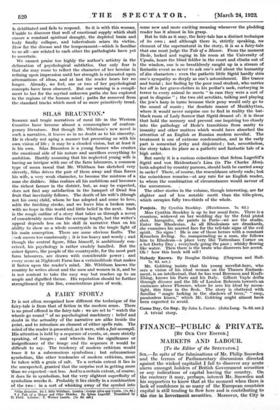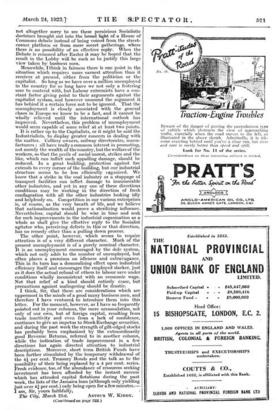FINANCE-PUBLIC & PRIVATE. [By OUR CITY EDITOR.]
MARKETS AND LABOUR.
[To the Editor of the SPECTATOR.] SIR,—In spite of the fulminations of Mr. Philip Snowden and the terrors of Parliamentary discussions directed against the wicked capitalist I fail to discover any acute alarm amongst holders of British Government securities ' or any indications of capital leaving the country. On the contrary it may, perhaps, interest Mr..Snowden and his supporters to know that at the moment when there is lack of confidence in so many of the European countries capital is still tending to flow here and is contributing to the rise in Investment securities. - Moreover, the City is not altogether sorry to see these pernicious Socialistic doctrines brought out into the broad light, of a House of Commons debate instead of being voiced from the street- corner platform or from mere secret gatherings, where there is no possibility of an effective reply: When the Debate is resumed after Easter it may be hoped that the result in the Lobby will be such as to justify this large view taken by business men. Meanwhile, Ithink in fairness there is one point in the situation which requires more earnest attention than it receives at present, either from the politician or the capitalist. So long as we have over a million unemployed in the country for so long have we not only a festering sore to contend with, but Labour extremists have a con- stant factor giving point to their arguments against the capitalist system, and however unsound the argument it has behind it a certain force not to be ignored. That the unemployment is closely associated with the general chaos m Europe we know to be a fact, and it cannot be wholly relieved until the international outlook has improved. Nevertheless, this problem of unemployment would seem capable of some relief at at least two points. It is rather up to the Capitalists, or it might be said the Industrialists, to display greater concern in dealing with the matter. Colliery owners, railway directorates, manu- facturers ; all have really a common interest in promoting, not merely the wealth of the country, but the welfare of the workers, so that the perils of social unrest, strikes and the like, which can inflict such appalling damage, should be reduced. In a great building, protection against fire extends to every corner of the building, but our industrial structure seems to be less efficiently organized. We know that a strike in the coal industry or a stoppage of transport facilities can inflict damage to innumerable other industries, and yet in any one of these directions conditions may be working in the direction of fresh conflagration with all the other industries looking idly and helplessly on. Competition in our various enterprises is, of course, as the very breath of life, and we believe that nationalization would prove a sterilizing influence. Nevertheless, capital should be wise in time and seek for such improvements in the industrial organization as a whole as shall give the effective reply to the Socialist agitator who, perceiving defects in this or that direction, has no remedy other than a pulling down process.
The other point, however, which seems to require attention is of a very different character. Much of the present unemployment is of a purely nominal character. It is an unemployment encouraged by the dole system, which not only adds to the number of unemployed, but often places a premium on idleness and extravagance. This in its turn has a demoralizing effect upon industrial efficiency itself and encourages the employed slacker, just as it does the actual refusal of others to labour save under conditions wholly inconsistent with an economic wage. Not that relief of a kind should entirely cease, but precautions against malingering should be drastic. I think, Sir, that these are considerations which are uppermost in the minds of a good many business men, and therefore I have ventured to introduce them into this letter. For the moment, however, as I have so frequently pointed out in your columns, the mere accumulation, not only of our own, but of foreign capital, resulting from trade inactivity and even from a lack of confidence, continues to give an impetus to Stock Exchange securities, and during the past week the strength of gilt-edged stocks has probably been emphasized by the extraordinarily good Revenue Returns, referred to in another column, while the indication Of trade improvement in a few directions has again directed attention to industrial descriptions. Moreover, short term British Funds have been further stimulated by the temporary withdrawal of the 41 per cent. Treasury Bonds and the talk as to the possibility of their being replaced by a 4 per cent. series. Fresh evidence, too, of the abundance of resources seeking investment has been afforded by the instant success which has attended capital flotations during the past week, the lists of the Jamaica loan (although only yielding ust over 41 per cent.) only being open for a few minutes.— I am, Sir, yours faithfully, (Continued on nage 522.)



































































 Previous page
Previous page